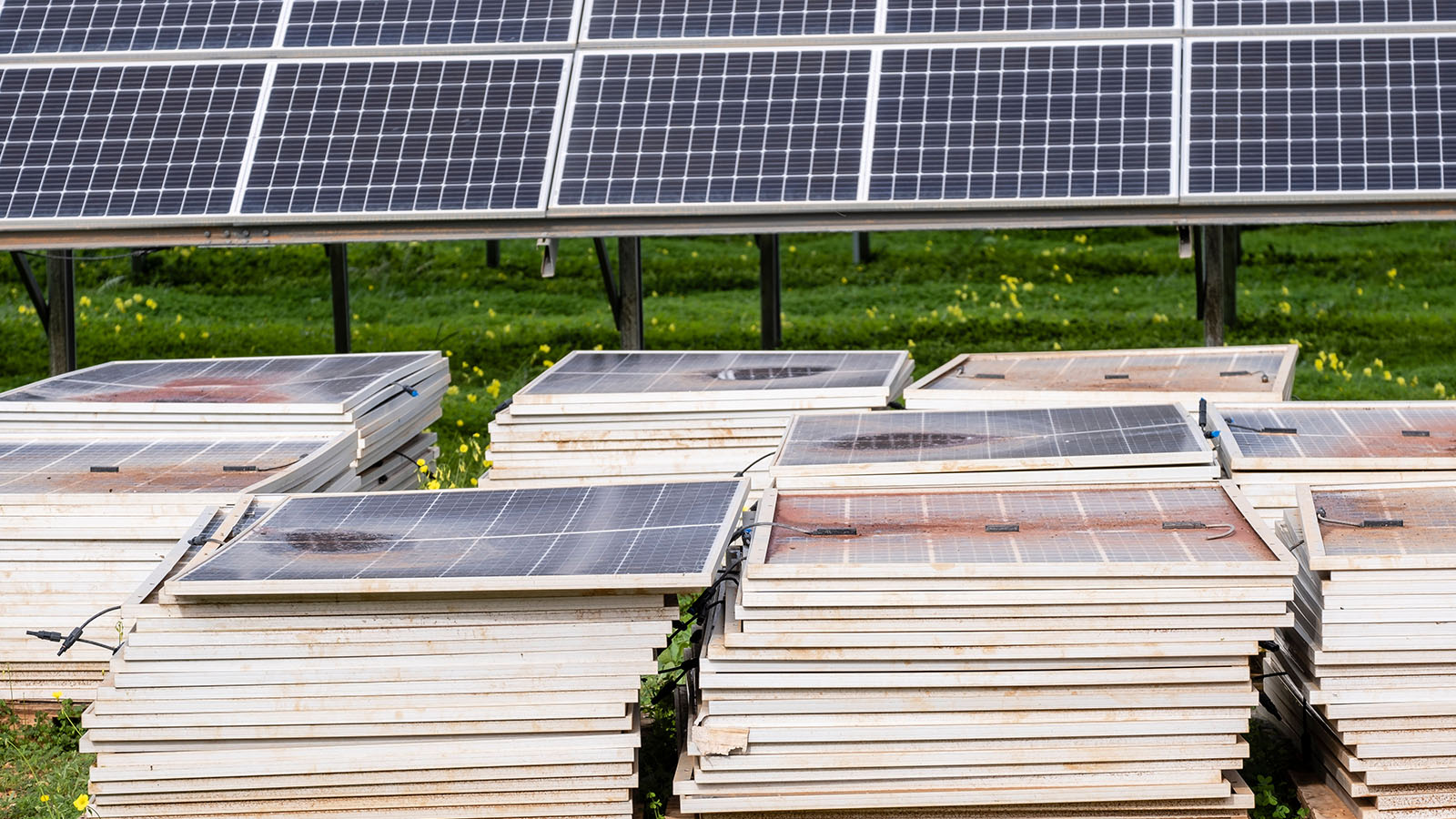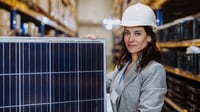You’re a reseller who sees great potential in expanding into the solar panel reuse and recycling market. You have a customer base inquiring about solar panels that are low-budget and eco-friendly. And you have vendor prospects to buy used solar panels from.
But you’re also uncertain about the quality of the goods for sale. Recently, you’ve seen news reports about solar panel waste being exported to other countries under the guise of reuse. You don’t want to risk tainting your company’s reputation.
How can you confirm you’re buying and selling quality solar panels for reuse rather than solar panel waste?
In this article, we provide best practices from activity we’ve observed on the EnergyBin exchange. Most members who are resellers offer both new and used solar panels. And although used modules only comprise between 3 and 7 percent of the total modules for sale on the exchange, member activity gives a clear view of secondary market top performers.
Buying Best Practices
The prospect of buying used solar panels that you believe would result in a high resale value presents itself. Follow these practices to ensure you’re purchasing quality goods.
Vet the vendor

Above all, it’s important to pre-qualify a vendor selling secondhand solar panels before you buy. You don’t want to inadvertently buy from someone who may be committing fraud, evading duties, or selling counterfeit or stolen goods.
Find reputable resellers on EnergyBin and in the R2 Directory. EnergyBin members have met our rigorous pre-qualifications, including providing proof of business registration and references from companies they’ve done business with the industry. R2 certified companies have passed SERI’s comprehensive analysis and are committed to managing solar panels in accordance with the hierarchy of reuse before recycling.
Here are some questions you can ask a prospective vendor to further qualify them with respect to your company’s buying standards:
- What products do you have available?
- Have the products been tested, and may I see the documented test results?
- Have any repairs been made to the goods?
- What are the associated warranties per product?
- Do you require a minimum order?
- What is the turn-around time for delivery?
- What is the return policy?
- Do you offer financing options?
- What payment terms are available?
- What is your replacement policy for goods damaged during shipping?
- Do you offer drop-shipping?
- What other value-added services do you offer to your customers?
- Would you provide 2-3 references?
To ensure products you buy meet quality standards, corporate social responsibility requirements, environmental considerations, and applicable laws, ask these questions suggested by Solar Energy Industries Association:
- Do you follow the SEIA Traceability Protocol? If not, why not?
- Do you and your suppliers have a corporate social responsibility code of conduct or policy in place? If so, can you share it?
- Does your code of conduct address the areas covered by the International Labor Organization's core labor standards?
- Do you communicate your code of conduct to your suppliers?
- What steps do you take to ensure that you and your suppliers are in compliance with [region's] laws and regulations?
- Can you show where the product is manufactured and where the inputs come from?
- Can you provide the most recent independent audit reports regarding your claims?
- Who conducted the audit? Was it conducted by a qualified, independent third-party organization?
- Are the audits announced or unannounced? How often are audits conducted?
Think of the vetting process as a necessary step to build a long-term relationship with another company. Once you’ve done your due diligence, and everything checks out, you’ll have a reliable source for buying used equipment.
Offer a decommissioning service

As the solar market matures, there are also ample opportunities to buy used modules from asset owners. Premature decommissions occur for several reasons, such as technology upgrades, change of ownership, and when PPA agreements end, which means modules aren’t yet ready to recycle.
On EnergyBin, we’ve seen large volumes of secondhand solar panels coming from insurance claims. Depending on the insurance policy, a PV asset owner may be able to replace an entire array following damage of a portion. The few damaged modules are recycled, and the remaining functioning modules are available for resale.
By offering a decommissioning service, your company gets first dibs on quality hardware that the asset owner pays you to pack up and take away. Additionally, you mitigate risk by properly packing and transporting modules to your facility. Most importantly, you ensure the modules will be appropriately handled for reuse and recycling, rather than end up in landfills.
Inspect and test solar panels

In addition to the previous considerations, you’ll want to take measures to determine the accurate condition of the solar panels available for sale.
Plan to inspect and test the solar panels. If you’re buying from a reputable reseller, they have likely completed this task and will provide you with documentation.
Otherwise, take necessary steps to conduct a hardware audit. Check the label condition and serial number. Conduct performance tests for power output. Look for defects, including glue marks, scratches, snail trails, burn marks, hotspots, cracked glass, and cracked backsheets.
Knowing the specifics is important for calculating the resale value. In general, solar panels with optimal resale value meet the following requirements:
- They are still functional.
- Their age (as defined by years in operation) is young enough that the panels can produce power for a minimum of 10-12 years more. Panels with an age of 10 years or less gain a higher resale value.
- The degradation rate is equal to an average of 0.5 to 1.9 percent per year over the panels’ total years of operation.
- They are free of defects. Or, if minor defects exist, then they’re clearly stated and ideally refurbished (e.g. junction box and/or fuses, wiring have been replaced).
As you test the modules, document your findings. Test results will also come in handy in remarketing efforts. For example, sellers on EnergyBin tend to attach test results to their inventory posts along with the manufacturers’ datasheets for buyers to review.
 For more wholesale buying best practices, read The Ultimate Guide to Buying Wholesale Solar Equipment.
For more wholesale buying best practices, read The Ultimate Guide to Buying Wholesale Solar Equipment.
Selling Best Practices
You’ve just purchased a bulk volume of used solar panels, and you’re now ready to prepare them for remarketing. Follow these practices to protect your company’s reputation and ensure you earn top dollar.
Digitize your PV hardware

Keeping a database of your inventory is to your benefit for many reasons. First, you have a reliable record of every SKU in your warehouse. Second, you guarantee transparency at the time of resale as you can provide the buyer with detailed documentation for their records. Third, you certify that refurbished hardware is suitable for reuse. And fourth, you build credibility as a reputable reseller.
It may take a little manpower on the front end to collect and input data, but the benefits outweigh the costs. Perhaps the best time to complete this task is upon receipt of material at your facility. We recommend documenting even those modules and hardware slated for recycling, which allows your company to report on your responsible recycling efforts.
For each product, collect the following data:
- Serial number
- Manufacturer
- Model
- Age (i.e. how long the product has been in operation)
- Power output in watts (Standard Test Conditions)
- Ratio of power output to the originally designed level (degradation rate as expressed as a percentage)
- All repairs made on the product
- Photos
- Evidence of data sanitation (if applicable)
- Product categorization (reuse or recycle)
For the last data point, if you are an R2 certified facility, you’ll use the R2 Equipment Categorization for Functioning Products as your product categorization guideline. Even if you’re not R2 certified, this would be an appropriate standardized guideline to use, as it’s recognized globally.
The decision to reuse or recycle will largely rely on several factors, including your company’s internal standards. Say your internal standard mandates that any solar module functioning at or above 50 percent of the original power output should be categorized for reuse. Any module functioning below 50 percent would then be set aside for recycling.
Whatever standards your company adheres to consider publishing them on your website in full transparency to your stakeholders.
Determine your list price

Starting out, this step will likely be challenging, as there is no universal base price for secondhand solar panels, and the market is presently small and sporadic. However, as you gain experience, you’ll become more confident in assessing resale value.
Your inventory database will be a reliable source for historical pricing that you can look back on. Additionally, EnergyBin publishes biannual reports that show spot prices from members posting modules for sale on the exchange. In the 2023 PV Module Price Index, resellers quoted an average price for used solar modules of $0.140 per watt. In the first half of this year, the average dropped to $0.098 per watt due to volatile price declines among all module classes.
Resellers on EnergyBin typically quote used module prices 50-75 percent less than new modules. Even so, be flexible and prepared to negotiate. Consider having a price scale based on quantity, in which the more modules a buyer purchases, the greater discount they receive. You could also include value-added services, such as shipping, limited warranty, and an end-of-life management return incentive program to create a package deal.
Be transparent in what you list for sale

There’s nothing more frustrating for a buyer than learning that a listed product for sale is not available, does not match the advertised condition, or varies in price from what is quoted. Strive for honesty and accuracy when listing your products for sale online. On EnergyBin, you must honor what you list or risk suspension or removal. Include testing documentation and photos. On EnergyBin, some resellers post photos of the label, one module, and the full lot.
You may want to create your own branded label to apply to the module that certifies the tested power output and condition on a specific date for that serial number. Perhaps this internal labeling process is synced with a company policy that guarantees the module’s performance for a limited time, such as 1-3 years.
If you sell the full or partial lot, update the listing as soon as possible. Also, keep an eye on your price. It’s perfectly acceptable to update prices online as market conditions change. But you don’t want to list a product for one price and then quote a higher price to the buyer. That goes against transparency.
The risk you run by withholding information or being elusive about the price is that you can quickly lose a buyer’s trust. In the solar industry, relationships bear weight. If it gets around that your company isn’t trustworthy, it could harm your reputation.
 For more wholesale selling best practices, read The Ultimate Guide to Selling Wholesale Solar Equipment.
For more wholesale selling best practices, read The Ultimate Guide to Selling Wholesale Solar Equipment.
Responsible recycling

As a reseller, you may be wondering what happens down the road when solar panels you’ve sold are at their life’s end. Whose responsibility is it to dispose of these solar panels?
That’s a great question. Ultimately, the responsibility to recycle lies with the owner at the time of the product’s end of life. As is the case in all product industries, gaps exist in the value chain that prevent a truly global circular economy.
However, some companies have resolved to eliminate, or at least minimize, waste in their downstream sales channels. For example, First Solar, a U.S.-based module manufacturer, designs products for high-value recycling and offers an end-of-life take-back program for their modules. PV Cycle, a European recycler, established pick-up services and drop-off locations for end-of-life modules throughout the region to make it convenient and cost-effective to recycle.
Think outside of the box about ways to close the loop of circularity. Offering a complimentary pick-up service for end-of-life modules or a recycling incentive may feel like an expense, but these innovative strategies could win deals on the front-end as buyers seek to fulfill their ESG goals and objectives. The opportunities are bountiful for those who use business as a force for good.


 Grow Your Revenue: Sell PV Hardware on EnergyBin
Grow Your Revenue: Sell PV Hardware on EnergyBin